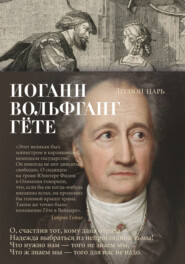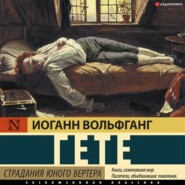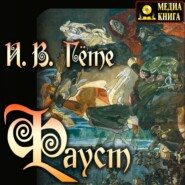По всем вопросам обращайтесь на: info@litportal.ru
(©) 2003-2024.
✖
The Autobiography of Goethe
Настройки чтения
Размер шрифта
Высота строк
Поля
It now seems necessary to state more circumstantially, and to make intelligible how, under these circumstances, I made my way with more or less ease through the French language, which, however, I had never learned. Here, too, my natural gift was of service to me, enabling me easily to catch the sound of a language, its movement, accent, tone, and all other outward peculiarities. I knew many words from the Latin; Italian suggested still more; and by listening to servants and soldiers, sentries and visitors, I soon picked up so much that, if I could not join in conversation, I could at any rate manage single questions and answers. All this, however, was little compared to the profit I derived from the theatre. My grandfather had given me a free ticket, which I used daily, in spite of my father's reluctance, by dint of my mother's support. There I sat in the pit, before a foreign stage, and watched the more narrowly the movement and the expression, both of gesture and speech, as I understood little or nothing of what was said, and therefore could only derive entertainment from the action and the tone of voice. I understood least of comedy, because it was spoken rapidly, and related to the affairs of common life, of the phrases of which I knew nothing. Tragedy was not so often played, and the measured step, the rhythm of the Alexandrines, the generality of the expression, made it more intelligible to me in every way. It was not long before I took up Racine, which I found in my father's library, and declaimed the pieces to myself, in the theatrical style and manner, as the organ of my ear and the organ of speech, so nearly akin to that, had caught it, and this with considerable animation, although I could not perceive the connexion of a whole speech. I even learned entire passages by rote, like a trained talking-bird, which was easier to me, from having previously committed to memory passages from the Bible which are generally unintelligible to a child, and accustomed myself to reciting them in the tone of the Protestant preachers. The versified French comedy was then much in vogue; the pieces of Destouches, Marivaux, and La CHAISE, were often produced, and I still remember distinctly many characteristic figures. Of those of Molière I recollect less. What made the greatest impression upon me was the Hypermnestra of Lemière, which, as a new piece, was brought out with care and often repeated. The Devin du Village, Rose et Colas, AnnetteLubin, made each a very pleasant impression upon me. I can even now recall the youths and maidens decorated with ribands, and their gestures. It was not long before the wish arose in me to see the interior of the theatre, for which many opportunities were offered me. For as I had not always patience to hear out the whole pieces, and often carried on all sorts of games with other children of my age in the corridors, and in the milder season even before the door, a handsome, lively boy joined us, who belonged to the theatre, and whom I had seen in many little parts, though only casually. He came to a better understanding with me than with the rest, as I could turn my French to account with him, and he the more attached himself to me because there was no boy of his age or his nation at the theatre, or anywhere in the neighbourhood. We also went together at other times, as well as during the play, and even while the representations went on he seldom left me in peace. He was a most delightful little braggart, chattered away charmingly and incessantly, and could tell so much of his adventures, quarrels, and other strange incidents, that he amused me wonderfully, and I learned from him in four weeks more of the language, and of the power of expressing myself in it, than can be imagined; so that no one knew how I had attained the foreign tongue all at once, as if by inspiration.
In the very earliest days of our acquaintance he took me with him upon the stage, and led me especially to the foyers, where the actors and actresses remained during the intervals of the performance, and dressed and undressed. The place was neither convenient nor agreeable, for they had squeezed the theatre into a concert-room, so that there were no separate chambers for the actors behind the stage. A tolerably large room adjoining, which had formerly served for card-parties, was now mostly used by both sexes in common, who appeared to feel as little ashamed before each other as before us children, if there was not always the strictest propriety in putting on or changing the articles of dress. I had never seen anything of the kind before, and yet from habit, after repeated visits, I soon found it quite natural.
"Derones" and his Sister.
It was not long before a very peculiar interest of my own arose. Young Derones, for so I will call the boy whose acquaintance I still kept up, was, with the exception of his boasting, a youth of good manners, and very courteous demeanour. He made me acquainted with his sister, a girl who was a few years older than we were, and a very pleasant, well-grown girl, of regular form, brown complexion, black hair and eyes; her whole deportment had about it something quiet, even sad. I tried to make myself agreeable to her in every way, but I could not attract her notice. Young girls think themselves far advanced beyond younger boys, and while aspiring to young men, they assume the manner of an aunt towards the boy whose first inclination is turned towards them. – With a younger brother of his I had no acquaintance.
Often, when their mother had gone to rehearsals, or was out visiting, we met at her house to play and amuse ourselves. I never went there without presenting the fair one with a flower, a fruit, or something else, which she always received very courteously, and thanked me for most politely, but I never saw her sad look brighten, and found no trace of her having given me a further thought. At last I fancied I had discovered her secret. The boy showed me a crayon-drawing of a handsome man, behind his mother's bed, which was hung with elegant silk curtains, remarking at the same time, with a sly look, that this was not papa, but just the same as papa; and as he glorified this man, and told me many things in his circumstantial and ostentatious manner, I thought I had discovered that the daughter might belong to the father, but the other two children to the intimate friend. I thus explained to myself her melancholy look, and loved her for it all the more.
My liking for this girl assisted me in bearing the extravagances of her brother, who was not always within bounds. I had often to endure prolix accounts of his exploits, how he had already often fought, without wishing to injure the other – all for the mere sake of honour. He had always contrived to disarm his adversary, and had then forgiven him; nay, he was such a good fencer, that he was once very much perplexed by striking the sword of his opponent up into a high tree, so that it was not easy to be got again.
What much facilitated my visits to the theatre was, that my free ticket, coming from the hands of the Schultheiss, gave me access to any of the seats, and therefore also to those in the proscenium. This was very deep, after the French style, and was bordered on both sides with seats, which, surrounded by a low rail, ascended in several rows one behind another, so that the first seats were but a little elevated above the stage. The whole was considered a place of special honour, and was generally used only by officers, although the nearness of the actors destroyed, I will not say all illusion, but, in a measure, all enjoyment. I have thus experienced and seen with my own eyes the usage or abuse of which Voltaire so much complains. If, when the house was very full at such time as troops were passing through the town, officers of distinction strove for this place of honour, which was generally occupied already, some rows of benches and chairs were placed in the proscenium on the stage itself, and nothing remained for the heroes and heroines but to reveal their secrets in the very limited space between the uniforms and orders. I have even seen the Hypermnestra performed under such circumstances.
The curtain did not fall between the acts, and I must yet mention a strange custom which I thought quite extraordinary, as its inconsistency with art was to me, as a good German boy, quite unendurable. The theatre was considered the greatest sanctuary, and any disturbance occurring there would have been instantly resented as the highest crime against the majesty of the public. Therefore in all comedies, two grenadiers stood with their arms grounded, in full view, at the two sides of the back scene, and were witnesses of all that occurred in the bosom of the family. Since, as I said before, the curtain did not fall between the acts, two others, while music struck up, relieved guard, by coming from the wings, directly in front of the first, who retired in the same measured manner. Now, if such a practice was well fitted to destroy all that in the theatre is called illusion, this is the more striking, because it was done at a time when, according to Diderot's principles and examples, the most natural naturalness was required upon the stage, and a perfect deception was proposed as the proper aim of theatrical art. Tragedy, however, was absolved from any such military-police regulations, and the heroes of antiquity had the right of guarding themselves; nevertheless, the same grenadiers stood near enough behind the side-scenes.
I will also mention that I saw Diderot's "Father of a Family," and "The Philosophers" of Palissot, and still perfectly remember the figure of the philosopher in the latter piece going upon all fours, and biting into a raw head of lettuce.
Duel with "Derones."
All this theatrical variety could not, however, keep us children always in the theatre. In fine weather we played in front of it, and in the neighbourhood, and committed all manner of absurdities, which, especially on Sundays and festivals, by no means corresponded to our personal appearance; for I and my comrades then appeared dressed as I described myself in the tale, with the hat under the arm, and a little sword, the hilt of which was ornamented with a large silk knot. One day when we had long gone in this way, and Derones had joined us, he took it into his head to assert to me that I had insulted him, and must give him satisfaction. I could not, in truth, conceive what was the cause of this; but I accepted his challenge, and was going to draw my sword. However, he assured me that in such cases it was customary to go to secluded spots, in order to be able to settle the matter more conveniently. We therefore went behind some barns, and placed ourselves in the proper position. The duel took place in a somewhat theatrical style, the blades clashed, and the thrusts followed close upon each other; but in the heat of the combat he remained with the point of his sword lodged in the knot of my hilt. This was pierced through, and he assured me that he had received the most complete satisfaction; then embraced me, also theatrically, and we went to the next coffee-house to refresh ourselves with a glass of almond-milk after our mental agitation, and to knit more closely the old bond of friendship.
On this occasion I will relate another adventure which also happened to me at the theatre, although at a later time. I was sitting very quietly in the pit with one of my playmates, and we looked with pleasure at a pas seul, which was executed with much skill and grace by a pretty boy about our own age – the son of a French dancing-master who was passing through the city. After the fashion of dancers, he was dressed in a close vest of red silk, which ending in a short hoop-petticoat, like a runner's apron, floated above the knee. We had given our meed of applause to this young artist with the whole public, when – I know not how – it occurred to me to make a moral reflection. I said to my companion, "How handsomely this boy was dressed, and how well he looked; who knows in how tattered a jacket he may sleep to-night!" – All had already risen, but the crowd prevented our moving. A woman who had sat by me, and who was now standing close beside me, chanced to be the mother of the young artist, and felt much offended by my reflection. Unfortunately, she knew German enough to understand me, and spoke it just as much as was necessary to scold. She abused me violently. Who was I, she would like to know, that had a right to doubt the family and respectability of this young man? At all events, she would be bound he was as good as I, and his talents might probably procure him a fortune, of which I could not even venture to dream. This moral lecture she read me in the crowd, and made those about me wonder what rudeness I had committed. As I could neither excuse myself nor escape from her, I was really embarrassed, and when she paused for a moment, said without thinking, "Well! why do you make such a noise about it? – to-day red, to-morrow dead."[6 - A German proverb, "Heute roth, morgen todt."] These words seemed to strike the woman dumb. She stared at me, and moved away from me as soon as it was in any degree possible. I thought no more of my words; only, some time afterwards, they occurred to me, when the boy, instead of continuing to perform, became ill, and that very dangerously. Whether he died or not, I cannot say.
Such intimations, by an unseasonably or even improperly spoken word, were held in repute even by the ancients, and it is very remarkable that the forms of belief and of superstition have always remained the same among all people and in all times.
From the first day of the occupation of our city, there was no lack of constant diversion, especially for children and young people. Plays and balls, parades, and marches through the town, attracted our attention in all directions. The last particularly were always increasing, and the soldiers' life seemed to us very merry and agreeable.
Marshal de Broglio.
The residence of the King's Lieutenant at our house procured us the advantage of seeing by degrees all the distinguished persons in the French army, and especially of beholding close at hand the leaders whose names had already been made known to us by reputation. Thus we looked from stairs and landing-places, as if from galleries, very conveniently upon the generals who passed by. Before all I remember the Prince Soubise as a handsome, courteous gentleman, but most distinctly the Marechal de Broglio, who was a younger man, not tall, but well-built, lively, active, and abounding in keen glances.
He often came to the King's Lieutenant, and it was soon remarked that the conversation was on weighty matters. We had scarcely become accustomed to having strangers quartered upon us in the first three months, when a rumour was obscurely circulated that the Allies were on the march, and that Duke Ferdinand of Brunswick was coming to drive the French from the Maine. Of these, who could not boast of any especial success in war, no high opinion was held, and after the battle of Rossbach it was thought they might be dispersed. The greatest confidence was placed in Duke Ferdinand, and all those favourable to Prussia awaited with eagerness their delivery from the yoke hitherto borne. My father was in somewhat better spirits – my mother was apprehensive. She was wise enough to see that a small present evil might easily be exchanged for a great affliction; since it was but too plain that the French would not advance to meet the Duke, but would wait an attack in the neighbourhood of the city. A defeat of the French, a flight, a defence of the city, if it were only to cover their rear and hold the bridge, a bombardment, a sack – all these presented themselves to the excited imagination, and gave anxiety to both parties. My mother, who could bear everything but suspense, imparted her fears to the Count through the interpreter. She received the answer usual in such cases: she might be quite easy, for there was nothing to fear, and should keep quiet and mention the matter to no one.
Many troops passed through the city; we learned that they halted at Bergen. The coming and going, the riding and running constantly increased, and our house was in an uproar day and night. At this time I often saw Marshal de Broglio, always cheerful, always the same in look and manner, and I was afterwards pleased to find a man whose form had made such a good and lasting impression upon me, so honourably mentioned in history.
Thus, after an unquiet Passion-week, the Good-Friday of 1759 arrived. A profound stillness announced the approaching storm. We children were forbidden to quit the house: my father had no quiet, and went out. The battle began: I ascended to the garret, where indeed I was prevented seeing the country round, but could very well hear the thunder of cannon and the general discharge of musketry. After some hours we saw the first symptoms of the battle in a line of wagons, in which the wounded, with various sad mutilations and gestures, were slowly drawn by us, to be taken to the convent of St. Mary, now transformed into a hospital. The compassion of the citizens was instantly moved. Beer, wine, bread, and money were distributed to those who were yet able to take them. But when, some time after, wounded and captive Germans were seen in the train, the pity knew no limits, and it seemed as if everybody would strip himself of every moveable that he possessed to assist his suffering countrymen.
The prisoners, however, were an evidence of a battle unfavourable to the allies. My father, whose party feelings made him quite certain that these would come off victorious, had the violent temerity to go forth to meet the expected victors, without thinking that the beaten party must pass over him in their flight. He first repaired to his garden before the Friedberg gate, where he found everything lonely and quiet, then he ventured to the Bernheim heath, where he soon descried various stragglers of the army, who were scattered and amused themselves by shooting at the boundary-stones, so that the rebounding lead whizzed round the head of the inquisitive wanderer. He therefore considered it more prudent to go back, and learned on enquiry what the report of the firing might have before informed him, that all stood well for the French, and that there was no thought of retreating. Reaching home in an ill-humour, the sight of his wounded and captured countrymen brought him altogether out of his usual self-command. He also caused various donations to be given to the passers by, but only the Germans were to have them, which was not always possible, as fate had packed together both friend and foe.
My mother and we children, who had already relied on the Count's word, and had therefore passed a tolerably quiet day, were highly rejoiced, and my mother doubly consoled, the next day, when having consulted the oracle of her treasure-box, by the prick of a needle, she received a very comfortable answer, both for present and future. We wished our father similar faith and feelings; we flattered him as much as we could; we entreated him to take some food, from which he had abstained all day; but he repulsed our caresses and every enjoyment, and betook himself to his chamber. Our joy, however, was not interrupted; the affair was decided; the King's Lieutenant, who, against his habit, had been on horseback to-day, at last returned home, where his presence was more necessary than ever. We sprang to meet him, kissed his hands, and testified our delight. This seemed much to please him. "Well," said he more kindly than usual, "I am glad also for your sakes, my dear children." He immediately ordered that sweetmeats, sweet wine, and the best of everything should be given us, and went to his room, already surrounded by a crowd of the urgent, the demanding, and the suppliant.
Quarrel with Count Thorane.
We had now a fine collation, pitied our poor father who would not partake of it, and pressed our mother to call him in; but she, more prudent than we, well knew how distasteful such gifts would be to him. In the meantime she had prepared some supper, and would readily have sent a portion up to his room, but he never tolerated such an irregularity even in the most extreme cases; and after the sweet things were removed, we endeavoured to persuade him to come down into the ordinary dining-room. At last he allowed himself to be persuaded unwillingly, and we had no notion of the mischief which we were preparing for him and ourselves. The staircase ran through the whole house, along all the ante-rooms. My father in coming down had to go directly past the Count's apartment. This ante-room was so full of people, that the Count, to get through much at once, resolved to come out, and this happened unfortunately at the moment when my father descended. The Count met him cheerfully, greeted him, and remarked, "You will congratulate yourselves and us that this dangerous affair is so happily terminated." "By no means!" replied my father in a rage; "would that it had driven you to the devil, even if I had gone with you." The Count restrained himself for a moment, and then broke out with wrath – "You shall pay for this," cried he; "you shall find that you have not thus insulted the good cause and myself for nothing!"
My father, meanwhile, came down very calmly, seated himself near us, seemed more cheerful than before, and began to eat. We were glad of this, unconscious of the dangerous method in which he had rolled the stone from his heart. Soon afterwards my mother was called out, and we had great pleasure in chattering to our father about the sweet things the Count had given us. Our mother did not return. At last the interpreter came in. At a hint from him we were sent to bed; it was already late, and we willingly obeyed. After a night quietly slept through, we heard of the violent commotion which had shaken the house the previous evening. The King's Lieutenant had instantly ordered my father to be led to the guard-house. The subalterns well knew that he was never to be contradicted; yet they had often earned thanks by delaying the execution of his orders. The interpreter, whose presence of mind never forsook him, contrived to excite this disposition in them very strongly. The tumult, moreover, was so great, that a delay brought with it its own concealment and excuse. He had called out my mother, and put the adjutant, as it were, into her hands, that by prayers and representations she might gain a brief postponement of the matter. He himself hurried up to the Count, who with great self-command had immediately retired into the inner room, and would rather allow the most urgent affair to stand still, than wreak on an innocent person the ill-humour once excited in him, and give a decision derogatory to his dignity.
The address of the interpreter to the Count, the train of the whole conversation, were often enough repeated to us by the fat interpreter, who prided himself not a little on the fortunate result, so that I can still describe it from recollection.
The "Gossip" and Count Thorane.
The interpreter had ventured to open the cabinet and enter, an act which was severely prohibited. "What do you want?" shouted the Count, angrily. "Out with you! – no one but St. Jean has a right to enter here."
"Well, suppose I am St. Jean for a moment," answered the interpreter.
"It would need a powerful imagination for that! Two of him would not make one such as you. Retire!"
"Count, you have received a great gift from heaven, and to that I appeal."
"You think to flatter me! Do not fancy you will succeed."
"You have the great gift, Count, even in moments of passion – in moments of rage, of listening to the opinions of others."
"Well, well, the question now is just about opinions, to which I have listened too long. I know but too well that we are not liked here, and that these citizens look askance at us."
"Not all!"
"Very many. What! These towns will be imperial towns, will they? They saw their emperor elected and crowned, and when, being unjustly attacked, he is in danger of losing his dominions and surrendering to an usurper; when he fortunately finds faithful allies who pour out their blood and treasure in his behalf – they will not put up with the slight burden that falls to their share, towards humbling the enemy!"
"But you have long known these sentiments, and have endured them like a wise man; they are, besides, held only by a minority. A few, dazzled by the splendid qualities of the enemy, whom you yourself prize as an extraordinary man, a few only – as you are aware."
"Yes, indeed! I have known and suffered it too long, otherwise this man would not have presumed to utter such insults to my face, and at the most critical moment. Let them be as many as they please, they shall be punished in the person of this their audacious representative, and perceive what they have to expect."
"Only delay, Count."
"In certain things one cannot act too promptly."
"Only a little delay, Count."
"Neighbour, you think to mislead me into a false step; you shall not succeed."
"I would neither lead you into a false step nor restrain you from one; your resolution is just; it becomes the Frenchman and the King's Lieutenant; but consider that you are also Count Thorane!"
"He has no right to interfere here."
"But the gallant man has a right to be heard."
"What would he say then?"
"King's Lieutenant," he would begin, "you have so long had patience with so many gloomy, untoward, bungling men, if they were not really too bad. This man has certainly been too bad, but control yourself, King's Lieutenant, and every one will praise and extol you on that account."
"You know I can often endure your jests, but do not abuse my good-will. These men – are they then completely blinded? Suppose we had lost the battle, what would have been their fate at this moment? We fight up to the gates, we shut up the city, we halt, we defend ourselves to cover our retreat over the bridge. Think you, the enemy would have stood with his hands before him? He throws grenades, and what he has at hand, and they catch where they can. This house-holder – what would he have? Hero, in these rooms, a bomb might now have burst, and another have followed it; – in these rooms, the cursed China-paper of which I have spared, incommoding myself, by not nailing up my maps! They ought to have spent the whole day on their knees."
How many would have done that!"
"They ought to have prayed for a blessing on us, and to have gone out to meet the generals and officers with tokens of honour and joy, and the wearied soldiers with refreshments. Instead of this, the poison of party-spirit destroys the fairest and happiest moments of my life, won by so many cares and efforts."
"It is party-spirit; but you will only increase it by the punishment of this man. Those who think with him will proclaim you a tyrant and a barbarian: – they will consider him a martyr, who has suffered for the good cause; and even those of the other opinion, who are now his opponents, will see in him only their fellow-citizen, will pity him, and while they confess your justice, will yet feel that you have proceeded too severely."

















